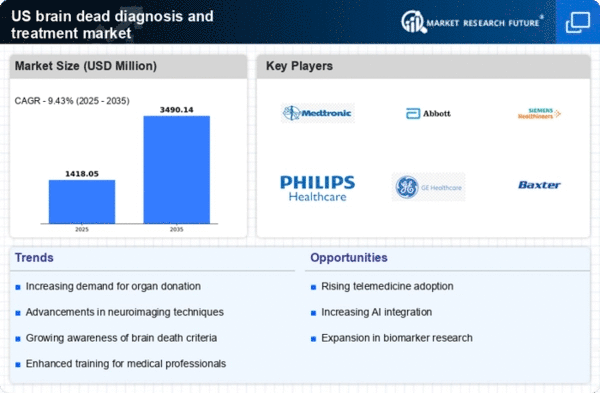Legislative Support for Organ Donation
Legislative measures aimed at promoting organ donation are significantly influencing the brain dead-diagnosis-and-treatment market. In the US, various states have enacted laws to streamline the organ donation process, which often necessitates accurate brain death diagnoses. These legislative efforts not only facilitate organ recovery but also raise public awareness about the importance of organ donation. As a result, healthcare providers are increasingly focused on ensuring that brain death assessments are conducted in accordance with legal and ethical standards. This alignment between legislation and medical practice is likely to drive growth in the brain dead-diagnosis-and-treatment market, as hospitals and clinics adapt to meet regulatory requirements while also addressing the needs of potential organ donors.
Growing Awareness of Brain Death Protocols
There is a notable increase in awareness regarding brain death protocols among healthcare professionals and the general public, which serves as a key driver for the brain dead-diagnosis-and-treatment market. Educational initiatives and training programs are being implemented to ensure that medical staff are well-versed in the criteria for diagnosing brain death. This heightened awareness is crucial, as it not only aids in the accurate identification of brain death but also fosters discussions about organ donation and end-of-life care. As more individuals understand the implications of brain death, the demand for standardized protocols and training resources is likely to rise, thereby enhancing the overall market landscape. The brain dead-diagnosis-and-treatment market is expected to benefit from this trend, as healthcare institutions prioritize education and protocol adherence.
Rising Incidence of Neurological Disorders
The increasing prevalence of neurological disorders in the US is a significant driver for the brain dead-diagnosis-and-treatment market. Conditions such as traumatic brain injury, stroke, and neurodegenerative diseases contribute to a higher number of patients requiring brain death assessments. According to recent data, neurological disorders account for approximately 20% of all deaths in the US, highlighting the urgent need for effective diagnostic and treatment solutions. This rising incidence not only emphasizes the importance of accurate brain death diagnosis but also propels advancements in treatment methodologies. As healthcare providers seek to improve patient outcomes, the demand for innovative technologies and protocols in the brain dead-diagnosis-and-treatment market is likely to grow, fostering a more robust industry landscape.
Advancements in Medical Imaging Technologies
Innovations in medical imaging technologies are transforming the brain dead-diagnosis-and-treatment market. Techniques such as MRI, CT scans, and PET scans have become increasingly sophisticated, allowing for more accurate assessments of brain function and determining brain death. The integration of artificial intelligence in imaging analysis further enhances diagnostic precision, potentially reducing the time required for evaluations. As imaging technologies evolve, healthcare facilities are likely to invest more in these advanced tools, driving market growth. The US market for medical imaging is projected to reach approximately $45 billion by 2026, indicating a strong correlation between imaging advancements and the brain dead-diagnosis-and-treatment market. This trend suggests that as imaging capabilities improve, so too will the accuracy and efficiency of brain death diagnoses.
Increased Investment in Healthcare Infrastructure
The ongoing investment in healthcare infrastructure across the US is a critical driver for the brain dead-diagnosis-and-treatment market. As hospitals and medical facilities expand and upgrade their capabilities, there is a corresponding need for advanced diagnostic tools and treatment options related to brain death. This investment trend is reflected in the projected growth of the US healthcare market, which is expected to reach $4 trillion by 2026. Enhanced infrastructure not only improves patient care but also supports the implementation of cutting-edge technologies in the brain dead-diagnosis-and-treatment market. As healthcare systems evolve, the demand for comprehensive brain death diagnostic services is likely to increase, fostering a more dynamic and responsive market environment.




















Leave a Comment